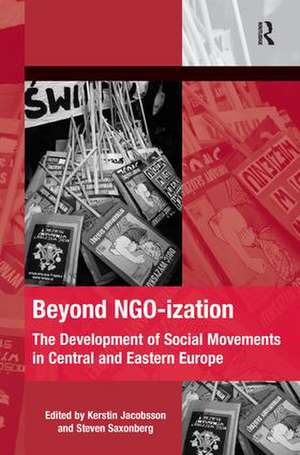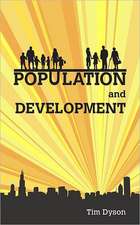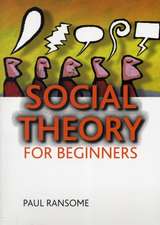Beyond NGO-ization: The Development of Social Movements in Central and Eastern Europe: The Mobilization Series on Social Movements, Protest, and Culture
Editat de Kerstin Jacobsson, Steven Saxonbergen Limba Engleză Paperback – 17 noi 2016
| Toate formatele și edițiile | Preț | Express |
|---|---|---|
| Paperback (1) | 469.34 lei 6-8 săpt. | |
| Taylor & Francis – 17 noi 2016 | 469.34 lei 6-8 săpt. | |
| Hardback (1) | 1058.86 lei 6-8 săpt. | |
| Taylor & Francis – 10 mai 2013 | 1058.86 lei 6-8 săpt. |
Din seria The Mobilization Series on Social Movements, Protest, and Culture
-
 Preț: 279.89 lei
Preț: 279.89 lei -
 Preț: 317.48 lei
Preț: 317.48 lei -
 Preț: 311.41 lei
Preț: 311.41 lei -
 Preț: 311.41 lei
Preț: 311.41 lei - 19%
 Preț: 270.20 lei
Preț: 270.20 lei - 17%
 Preț: 259.98 lei
Preț: 259.98 lei - 17%
 Preț: 259.98 lei
Preț: 259.98 lei -
 Preț: 382.95 lei
Preț: 382.95 lei - 17%
 Preț: 259.98 lei
Preț: 259.98 lei -
 Preț: 416.22 lei
Preț: 416.22 lei -
 Preț: 382.91 lei
Preț: 382.91 lei - 18%
 Preț: 1000.27 lei
Preț: 1000.27 lei - 17%
 Preț: 259.98 lei
Preț: 259.98 lei - 30%
 Preț: 846.11 lei
Preț: 846.11 lei - 13%
 Preț: 297.99 lei
Preț: 297.99 lei -
 Preț: 389.66 lei
Preț: 389.66 lei -
 Preț: 382.57 lei
Preț: 382.57 lei - 17%
 Preț: 178.76 lei
Preț: 178.76 lei -
 Preț: 386.35 lei
Preț: 386.35 lei - 25%
 Preț: 767.20 lei
Preț: 767.20 lei - 18%
 Preț: 1000.27 lei
Preț: 1000.27 lei -
 Preț: 416.22 lei
Preț: 416.22 lei - 18%
 Preț: 272.97 lei
Preț: 272.97 lei -
 Preț: 215.73 lei
Preț: 215.73 lei -
 Preț: 482.56 lei
Preț: 482.56 lei -
 Preț: 436.14 lei
Preț: 436.14 lei -
 Preț: 385.54 lei
Preț: 385.54 lei - 18%
 Preț: 1054.71 lei
Preț: 1054.71 lei
Preț: 469.34 lei
Nou
Puncte Express: 704
Preț estimativ în valută:
89.81€ • 94.02$ • 74.31£
89.81€ • 94.02$ • 74.31£
Carte tipărită la comandă
Livrare economică 05-19 aprilie
Preluare comenzi: 021 569.72.76
Specificații
ISBN-13: 9781138279650
ISBN-10: 113827965X
Pagini: 280
Dimensiuni: 156 x 234 x 15 mm
Greutate: 0.45 kg
Ediția:1
Editura: Taylor & Francis
Colecția Routledge
Seria The Mobilization Series on Social Movements, Protest, and Culture
Locul publicării:Oxford, United Kingdom
ISBN-10: 113827965X
Pagini: 280
Dimensiuni: 156 x 234 x 15 mm
Greutate: 0.45 kg
Ediția:1
Editura: Taylor & Francis
Colecția Routledge
Seria The Mobilization Series on Social Movements, Protest, and Culture
Locul publicării:Oxford, United Kingdom
Notă biografică
Kerstin Jacobsson is Professor of Sociology at Södertörn University, Sweden. Steven Saxonberg is Professor of Sociology at Masaryk University, Czech Republic.
Recenzii
"This fine collection provides a differentiated and nuanced picture of social movements in post-communist Central and Eastern Europe, convincingly stressing the great variation in their goals, structures, and strategies that can only be understood when taking into account their specific contexts. It offers rich insights into recent processes of political mobilization in post-communist societies and provides strong arguments for embedding the study of social movements into a broader look at civil society and the role of the state."― Dieter Rucht, Social Science Research Center Berlin, Germany
"Using case studies from several post-communist European countries, this fascinating anthology updates our understanding of the functioning of civil society organizations. The eclectic collection challenges the reader to think differently about social movements, focusing on the impact of differing political contexts, organizational structures, and types and levels of funding on the legitimacy, scope, strategies, and viability of post-communist NGOs."― Alena Heitlinger, Trent University, Ontario, Canada
"The book rigorously integrates theoretical approaches with empirical evidence drawn predominantly from case studies. It also deliberately broadens the groups analyzed, capturing under-investigated social issues related to gay rights, animal rights, environmental movements, conservative women, mothers, and family organizations, in addition to anti-immigration xenophobic movements and the Color Revolutions... the present volume introduces a novel approach to social movements in the CEE that goes beyond the common NGO-ization diagnosis, marking a turn in the study of social activism in the region, while calling for further, particularly comparative, research."― Council for European Studies - Reviews and Critical Commentary
"The volume brings together significant new and updated research on social movements in post-communist European societies... the volume offers a timely re-thinking of social movements in the CEE region and the findings bring relevant critique to many of the dichotomies that flourish in the social movement literature more generally."― Acta Sociologica
"Anthropologists concerned with social movements may find useful examples within these chapters, but anyone researching in CEE will find that this volume provides new insight on the changing nature of the relationship between states and political subjects following the collapse of state socialism in the region."― Anthropology of East Europe Review
"This book gives a nuanced and updated view of social movements in post-communist Europe, by looking at the cases of relatively successful mobilization, by examining groups that have often been neglected in the discourse on social movements and civil society (including animal-rights groups, racist movements and non-feminist family organizations), and by giving a deeper analysis of the different strategies that civil society organizations and groups can use. The collection of studies and reports is very useful and even crucial for understanding the specifics of social activism in Eastern Europe. The book is well structured and presents a diversity of approaches, which is a huge advantage of the NGOs in Central and Eastern Europe."― Polish-studies.Interdisciplinary (Pol-Int)
"This edited volume brings together scholars interested in social movements, political participation, and civil society in Eastern Europe. The book’s overarching objective is to situate Eastern European social movement mobilization, which takes place in particular institutional, normative, and cultural contexts, within existing theoretical frameworks... Beyond NGO-ization raises important empirical and theoretical questions about the ways in which scholars and activists understand movement emergence and dynamics and is an important contribution for students and scholars of political sociology and social movements."― David Pettinicchio, University of Oxford
"A strength of Beyond NGO-ization is that its core analytical themes, expertly argued by the editors (NGO-ization, civil society weakness/strength, and communist legacies), consistently frame each empirical study, while the chapter authors skillfully engage with distinct social movement research streams that focus on framing (e.g., adapting to the discourse of neoliberalism), political opportunity structures (e.g., elections and policy mechanisms), and resource mobilization (e.g., tax donations and cultural resources). Therefore, the volume will be stimulating reading even for students of social movements without an interest in Eastern Europe... This book, one of the finest editorial products, will be of particular appeal to students of nonprofits, social movements, and social change."― Erzsébet Fazekas, University at Albany, SUNY, Contemporary Sociology: A Journal of Reviews
"Using case studies from several post-communist European countries, this fascinating anthology updates our understanding of the functioning of civil society organizations. The eclectic collection challenges the reader to think differently about social movements, focusing on the impact of differing political contexts, organizational structures, and types and levels of funding on the legitimacy, scope, strategies, and viability of post-communist NGOs."― Alena Heitlinger, Trent University, Ontario, Canada
"The book rigorously integrates theoretical approaches with empirical evidence drawn predominantly from case studies. It also deliberately broadens the groups analyzed, capturing under-investigated social issues related to gay rights, animal rights, environmental movements, conservative women, mothers, and family organizations, in addition to anti-immigration xenophobic movements and the Color Revolutions... the present volume introduces a novel approach to social movements in the CEE that goes beyond the common NGO-ization diagnosis, marking a turn in the study of social activism in the region, while calling for further, particularly comparative, research."― Council for European Studies - Reviews and Critical Commentary
"The volume brings together significant new and updated research on social movements in post-communist European societies... the volume offers a timely re-thinking of social movements in the CEE region and the findings bring relevant critique to many of the dichotomies that flourish in the social movement literature more generally."― Acta Sociologica
"Anthropologists concerned with social movements may find useful examples within these chapters, but anyone researching in CEE will find that this volume provides new insight on the changing nature of the relationship between states and political subjects following the collapse of state socialism in the region."― Anthropology of East Europe Review
"This book gives a nuanced and updated view of social movements in post-communist Europe, by looking at the cases of relatively successful mobilization, by examining groups that have often been neglected in the discourse on social movements and civil society (including animal-rights groups, racist movements and non-feminist family organizations), and by giving a deeper analysis of the different strategies that civil society organizations and groups can use. The collection of studies and reports is very useful and even crucial for understanding the specifics of social activism in Eastern Europe. The book is well structured and presents a diversity of approaches, which is a huge advantage of the NGOs in Central and Eastern Europe."― Polish-studies.Interdisciplinary (Pol-Int)
"This edited volume brings together scholars interested in social movements, political participation, and civil society in Eastern Europe. The book’s overarching objective is to situate Eastern European social movement mobilization, which takes place in particular institutional, normative, and cultural contexts, within existing theoretical frameworks... Beyond NGO-ization raises important empirical and theoretical questions about the ways in which scholars and activists understand movement emergence and dynamics and is an important contribution for students and scholars of political sociology and social movements."― David Pettinicchio, University of Oxford
"A strength of Beyond NGO-ization is that its core analytical themes, expertly argued by the editors (NGO-ization, civil society weakness/strength, and communist legacies), consistently frame each empirical study, while the chapter authors skillfully engage with distinct social movement research streams that focus on framing (e.g., adapting to the discourse of neoliberalism), political opportunity structures (e.g., elections and policy mechanisms), and resource mobilization (e.g., tax donations and cultural resources). Therefore, the volume will be stimulating reading even for students of social movements without an interest in Eastern Europe... This book, one of the finest editorial products, will be of particular appeal to students of nonprofits, social movements, and social change."― Erzsébet Fazekas, University at Albany, SUNY, Contemporary Sociology: A Journal of Reviews
Cuprins
Chapter 1 Introduction: The Development of Social Movements in Central and Eastern Europe, Kerstin Jacobsson, Steven Saxonberg; Chapter 2 Channeling and Enrollment: The Institutional Shaping of Animal Rights Activism in Poland, Kerstin Jacobsson; Chapter 3 At the Intersection of Gender and Class: Social Mobilization Around Mothers’ Rights in Poland, Renata E. Hryciuk, El?bieta Korolczuk; Chapter 4 1Special thanks are due to the activists of the Hungarian home-birth movement who provided information for this chapter. I am very grateful to Gabriella Nagy and Júlia Spronz for offering updates., Katalin Fábián; Chapter 5 1This work has been prepared as part of a research project funded by the Foundation for Baltic and East European Studies (grant 1751/42/2008) as well as a research project (code GAP404/10/1586) funded by the Czech Science Foundation., Steven Saxonberg; Chapter 6 From NGOs to Naught: The Rise and Fall of the Czech Gay Rights Movement, Conor O’Dwyer; Chapter 7 1 This work has been prepared as part of the research project Collective Action and Protest in East-Central Europe (code GAP404/11/0462) funded by the Czech Science Foundation., Ond?ej Císa?; Chapter 8 The Social Movement Against Immigration as the Vehicle and the Agent of Racialization in Russia, Nikolay Zakharov; Chapter 9 “Taganka 3” Group: An Instance of Local Urban Activism in Moscow, Aleh Ivanou; Chapter 10 1The research for this chapter was undertaken as part of the EU Compliance in Bosnia-Herzegovina and Serbia (ECoBHAS) project funded by the UK Arts and Humanities Research Council (Grant no. 127796)., Adam Fagan, Indraneel Sircar; Chapter 11 Mobilizing against Post-Communist Autocracy: The Challenge of Competitive Authoritarianism, Philipp Kuntz; conclusion Conclusion, Kerstin Jacobsson, Steven Saxonberg;
Descriere
This book gives a nuanced and updated view of social movements in post-communist Europe, by looking at the cases of relatively successful mobilization, by examining groups that have often been neglected in the discourse on social movements and civil society (including animal rights groups, racist movements and non-feminist family organizations), an









